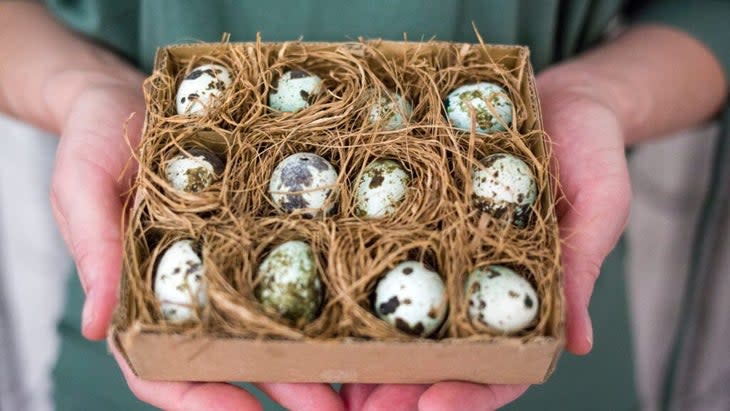Should You Be Using Quail Eggs in Your Morning Omelet?
This article originally appeared on Outside
them Food for thought: the average American ate 277 eggs in 2022 - that's a lot of omelets. What this data omits, however, is what kind of eggs Americans ate. There's a type that deserves recognition for its taste and nutritional value: quail eggs. You might not have tried them before, but these tiny powerhouses might merit a spot in your protein-packed breakfast.
The Nutritional Breakdown
Quail eggs are about a fifth of the size of chicken eggs with brown speckles dotting the shell. Approximately five quail eggs (weighing in at 9g each) equate to a chicken egg, which weighs 50g. Although a single quail egg contains just 14 calories, it's a surprisingly nutrient-dense food, thanks to its proportionally large yolk. Their yolks make up about half of their weight while chicken egg yolks make up only 35%. For this reason, bite for bite, quail eggs contain more calcium, Vitamin E, and riboflavin. Bigger yolk, more vitamins!
In the same breath, the larger yolk also means that there's more cholesterol in quail eggs (76mg per egg) versus chicken eggs (165mg per egg). And since five quail eggs equates to the same volume as a single chicken egg, that 76mg adds up to 380mg. It's a big number, right? Well, the cholesterol in both eggs is high-density lipoprotein (HDL), or as some people call it, "good cholesterol." According to the Mayo Clinic, HDL gets the “good” cholesterol label because it supposedly helps remove other forms of cholesterol from your bloodstream.
However, this claim has been contested by a 2022 study that challenges "good" cholesterol's benefits. The research found that HDL cholesterol doesn't always mean lower risk of cardiovascular disease, which was once thought to be factual. More research needs to be done on the topic to confirm HDL cholesterol's role in our health; talk to your doctor if you aren't sure how much cholesterol is right for your diet.

Cooking with Quail Eggs
Quail and chicken eggs taste similar, with one distinction.
"Quail eggs are creamier and luscious," says Beth Lipton, a cookbook author and health coach. "In terms of comparing chicken and quail eggs' flavor, it depends somewhat on what kind of chicken eggs you're used to eating. If you eat pastured eggs, you might be accustomed to a slightly earthier or grassier taste than conventionally-raised eggs. Quail eggs have that same quality."
A quail egg's large yolk creates a creamy, rich flavor that can be described as smoother and milder than chicken eggs.
Recipe developer Kathleen Higashiyama says, besides the yolk size, one of the biggest differences between cooking quail and chicken eggs is timing.
"The small size impacts the cook time more than the size of the yolk," she says. "Soft-boiled quail eggs only take a couple of minutes to cook for silky whites and jammy yolks, versus 6-7 minutes for a chicken egg."
Yolks aren't the only tricky part t. Their shells can be tough to crack.
"They're brittle on the outside, so they can shatter," Lipton says. "But the membrane inside the shell is more flexible than a chicken egg, so you can't simply crack quail eggs the way you do chicken eggs.
She suggests using the tip of a sharp knife to pierce the top, or slice it off with a small serrated knife or purchase a pair of quail egg scissors to more easily handle the softer shell, says Lipton. These scissors have a side to hold the egg securely in place, and another side to accurately snip the top of the shell off, leaving the yolk undisturbed.
Use the five-to-one ratio when a recipe calls for a chicken egg and you want to use quail. However, given that quail eggs are more expensive and less available than chicken eggs, you might want to save using them in recipes where their rich, creamy flavor will be featured. For instance, in homemade mayonnaise, custard, hollandaise, and meringue. Also, their bite-size nature of quail eggs makes them great stand-alone appetizers.
Aaron Oosterhoff, owner of Spring Creek Quail Farms in Saint Anns, Ontario, is one of the biggest proponents of quail eggs. He started working on his family farmwhen he was 14, and has slowly been working to make affordable and accessible. He remembers, at 27, first pitching them to retail stores and being met with skepticism.
"They were like, 'Why? Who eats these?'" Oosterhoff says.
Tunes changed, however, and there are now Spring Creek quail eggs in 2,000 stores in the U.S. and Canada. Today, Oosterhoff runs Spring Creek and is determined to do away with the idea that they are associated with the likes of caviar - culinary delicacies that you'd have to splurge on to enjoy.
"I think the problem with the quail egg is that most people don't know where to buy it," he says. "My personal mission is to see them on grocery store shelves across North America."
For exclusive access to all of our fitness, gear, adventure, and travel stories, plus discounts on trips, events, and gear, sign up for Outside+ today.

